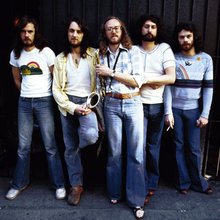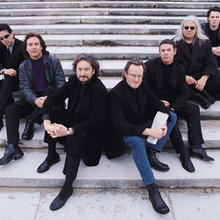Supertramp began as the wish fulfillment of a millionaire rock fan. By the late 1970s, the group's blend of keyboard-heavy progressive rock and immaculate pop had yielded several hit singles and a few platinum LPs.
In the late 1960s Dutch millionaire Stanley August Miesegaes heard Rick Davies in a band called the Joint. When that band broke up, Miesegaes offered to bankroll a band if Davies would handle the music. Davies placed classified ads in London newspapers for a band. The first response was from Roger Hodgson, who was to split songwriting and singing with Davies in Supertramp, the name they took from W.H. Davies' 1938 book, The Autobiography of a Supertramp. Drummer Bob Miller suffered a nervous breakdown after their first LP's release; he was replaced by Kevin Currie for the next, but like the first, it flopped.
After a disastrous tour, the band (except Davies and Hodgson) broke up. Davies and Hodgson recruited Bob Benberg from pub rockers Bees Make Honey, and John Helliwell and Dougie Thomson from the Alan Bown Set, and A&M sent them to a rehearsal retreat at a seventeenth-century farm. Their next LP, Crime of the Century, was the subject of a massive advertising/promotional campaign, and went to #1 in the U.K. but didn't take off commercially in the U.S., though it did sow the seeds of a cult following.
In 1975 the singles "Dreamer" and "Bloody Well Right" from Crime achieved some chart success in both the U.K. and the U.S. Supertramp toured the U.S. as a headliner, with A&M giving away most of the tickets. Crisis? failed to yield a hit single, but was heavily played on progressive FM radio and solidified the band's audience base, as did Even in the Quietest Moments (#16, 1977), which included "Give a Little Bit" (#15, 1977). Supertramp's breakthrough was Breakfast in America, a #1 worldwide LP, which eventually sold over 4 million copies in the U.S. and contained hit singles in "The Logical Song" (#6), "Goodbye Stranger" (#15), and "Take the Long Way Home" (#10). The Paris live double LP hit #8; and ". . . famous last words . . ." included another hit, "It's Raining Again" (#11, 1982). In early 1983 Hodgson announced he was leaving the group for a solo career. His first solo release, In the Eye of the Storm (#46, 1984), contained his only charting single to date, "Had a Dream (Sleeping With the Enemy)" (#48, 1984). His subsequent work was not as well received.
The group's next album, Brother Where You Bound (#21, 1985), contained Supertramp's last charting single to date, "Cannonball" (#28, 1985). Late in 1985 Supertramp embarked on a six-month tour of the United States. Hodgson briefly rejoined to promote the U.K. Top 10 compilation The Autobiography of Supertramp. Free As a Bird (1987) missed the Top 100 by one and included a dance hit, "I'm Begging You." In 1997 Davies, Helliwell, and Benberg regrouped Supertramp —minus Hodgson —and, with the aid of studio players, released Some Things Never Change.
1987's Free as a Bird experimented in heavily synthesised music, such as "I'm Beggin' You", which reached number 1 on the US dance charts. The stylistic change was generally not well-received, however, and the album itself reached only no. 93 in the UK and 101 in the USA, breaking a streak of seven consecutive top 100 efforts on the American charts.
In addition to their shift towards less commercially-oriented material, the band members decided to drop all of Hodgson's compositions from their setlist in order to further establish an identity separate from Hodgson. However, audiences were angered by the omissions of these songs, and though Supertramp toured again in 1985 using only Davies's compositions, in 1988 the pressure of their first Brazilian tour drove them to reintroduce a handful of Hodgson-penned hits to their set.
After 1988's tour, the group fragmented. Davies later explained, "We'd been out there for about 20 years just recording and touring and it seemed time to have a break with no ideas as to if or when we would come back. We decided not to actually say anything, just sort of fade away like an old soldier."
1996–2009: Later years
In 1996 Davies re-formed Supertramp with Helliwell, Siebenberg and guitarist/vocalist Mark Hart, who was new to the official lineup but had prominently contributed to Free as a Bird and its supporting tour. Four new members were added as well, bringing the band up to an eight-man lineup. The result of this reunion was Some Things Never Change, an album that echoed the earlier Supertramp sound, released in March 1997. It reached no. 74 in the UK.
In the summer of 1997, Supertramp returned to the road, resulting in the live It Was the Best of Times (1999), followed by Slow Motion in April 2002 and a 2002 worldwide tour, after which the band went inactive once again. Another attempt to bring Hodgson back into the band failed in 2005.
Supertramp continued to play several Hodgson-penned songs during live shows following their reunion. Hodgson subsequently claimed that the band's explanation for dropping his compositions from their setlist back in 1983 is a lie, and that the real reason was that he and Davies made a verbal agreement that they would not play those songs. Davies has never publicly alluded to such an agreement, and former member Dougie Thomson has commented "Nobody except Rick and Roger were privy to that conversation. Rick and Roger had several dialogues that no one else was privy to. Again, that's hearsay."
In 2008 it was announced that Supertramp's music would be featured in the film adaptation of Irvine Welsh's best-selling novel Ecstasy: Three Tales of Chemical Romance. In 2009 Hodgson said he could not see a Supertramp reunion ever happening: "We've looked at it and talked it over... I would never say never but Rick [Davies] has pretty much retired right now and I'm in the prime of my life. The reaction I am getting from fans is 'please don’t reunite'."
2010–present: Re-formation
On 21 April 2010 it was announced that Supertramp would give 35 concerts in late 2010. Dates were announced for concerts in Germany, Portugal, the Netherlands, Italy, France and other European countries. This tour called "70-10" was to commemorate the 40th anniversary of the group's first release.
Roger Hodgson embarked on a solo 2010 tour to Australia, New Zealand, South America, Europe, Canada, and the US, and thus was unable to rejoin the band for the 70-10 tour. However, in response to a fan campaign, Hodgson sent a letter to Rick Davies and had his manager send one to Davies' management, offering to join them for select dates during gaps in his tour schedule. Davies did not reply, but his agents notified Hodgson that his offer was declined.
In 2011 both Hodgson and Supertramp continued to tour separately. When asked whether Roger Hodgson might appear on some of the 2011 dates Davies replied, "I know there are some fans out there who would like that to happen. There was a time when I had hoped for that too. But the recent past makes that impossible. In order to play a great show for our fans, you need harmony, both musically and personally. Unfortunately that doesn’t exist between us any more and I would rather not destroy memories of more harmonious times between all of us.

